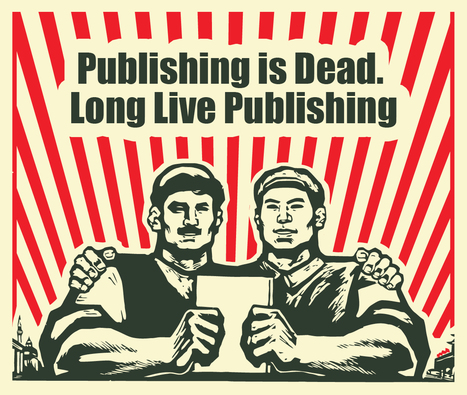by Gabe Stein
"The nature of Amazons business is changing to reflect a new media landscape. What does Bezos see in the future of publishing that the rest of us dont"
"Purpose-built distribution networks for different kinds of content are beginning to solidify into infrastructure, just as e-commerce did 10 years ago. And if we’ve learned anything about Bezos, it’s that he loves to own his own infrastructure and leverage it into new kinds of business we can’t even imagine right now."



 Your new post is loading...
Your new post is loading...




![Digital Publishing for Filmmakers: The Karada and The Silent History [#Transmedia] | :: The 4th Era :: | Scoop.it](https://img.scoop.it/Z_BlnpsWdAZkdO5cObGpSDl72eJkfbmt4t8yenImKBVvK0kTmF0xjctABnaLJIm9)








These two posts about Bezos, the Washington Post, and "total retail domination' (positioned very close to each other on this page) might, at first glance, have little to do with education. In addition, to fully understand the sentence in the last paragraph above ("Purpose-built distribution networks for different kinds of content are beginning to solidify into infrastructure, just as e-commerce did 10 years ago.) requires, for most of us I think, a deep and reflective reading of the article that contains it. This is challenging stuff to get one's mind around.
Certainly we can see the emergence of "purpose-build distribution networks for content" in the education space. Services such as Edmodo, Schoology, the ebook publishing services of Apple and others, iTunes U, MOOCs, LMSs such as Moodle and Blackboard, Discovery Network, and certainly Rupert Murdock's Amplify are all attemps to create infrastructures. The extent to which these services seek to dominate this space depend, it seems to me, largely on the profit motives of their owners. In the cases of Apple, Blackboard, and Amplify, their commitment to profit necessitates a drive toward domination of the marketplace. In the cases of Moodle and other non-profit or open source endeavors, the drive toward market domination is perhaps less strong.
Bezos' purchase of the Washington Post is but a blip, albeit perhaps (metaphorically at least) a significant one, on the radar screen of distribution networks solidifying into infrastructures. Seen in the context of Amazon's drive to domiinate retail distribution, this clarifies (at least for me) the land rush that is the current frantic battle of numeroous entities to become dominant in the digital delivery of content to schools.
For about a century, delivery of content to schools has been the province of the textbook publishers. The mergers, sell-offs, and unfriendly takeovers in this industry have narrowed the field to a very few survivors...all of which are now struggling (unsuccessfully) to survive the digital onslought.
Just follow the money. The companies that manage to become dominant in the digital distribution of content, to become the infrastructure of educational content delivery, stand to reap billions of dollars. And the tendancy of this market to narrow the number of competitors over time (as happened with textbooks) means that only a very few players may come to decide just what the content will be that students receive in school. This concentration of power, and potential narrowing of perspective, seem to be the kinds of trends that responsible educators, dedicated to development of self-directed learners, would see as dangerous to the American ideals of freedom and liberty.
Jeff Bezos is not the enemy here. In fact, he should probably be thanked for heightening our awareness of what is going on around us.